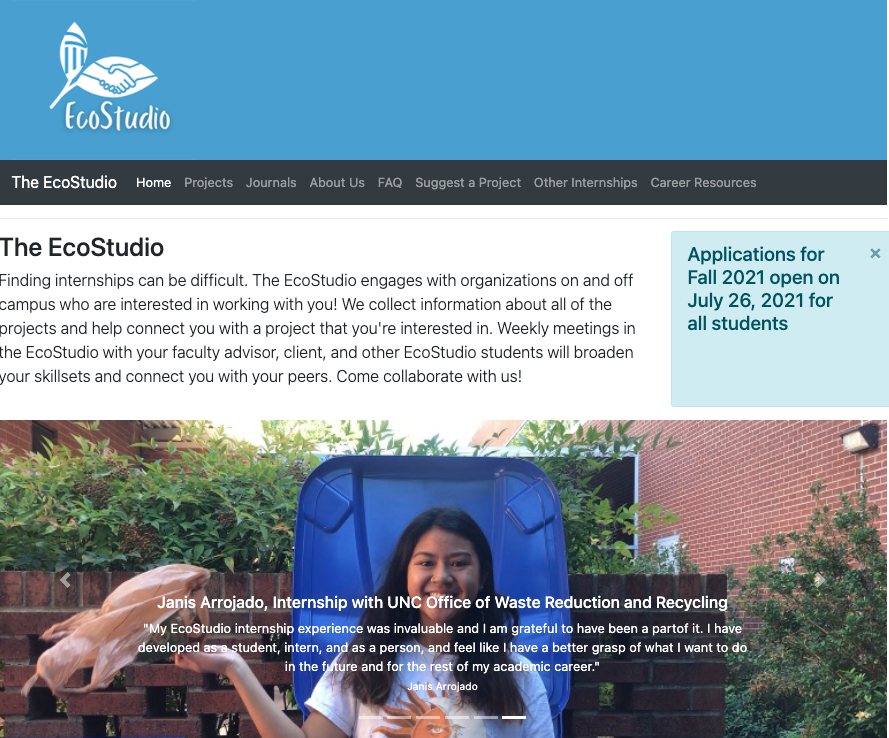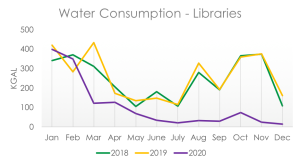EcoStudio provides professional development through coursework, internships
July 11, 2021
The EcoStudio at UNC-Chapel Hill began as an idea to pair students with UNC environmental and sustainability entities to give students workplace experience and a chance to make a difference at Carolina. Now in its fourth year, the EcoStudio has expanded beyond Carolina into the local community and state giving students and organizations the reciprocal benefit of more productivity and workplace experience.
“The projects run the gamut,” says Brian Naess an instructor and co-coordinator of EcoStudio. “They fall well beyond what you would normally consider to be traditional sustainability or environment-related projects. This summer we’ve got a student working with Circle K, and another student working with Tanger Outlets. As companies get more and more sustainability-related directives, they are looking to have students help them do some of the leg work.”
Students apply to EcoStudio for a semester or summer and are paired with an organization and mentor that matches their professional interests. They also receive course credit and meet weekly with faculty and their student cohort for networking and professional development.
“The EcoStudio weekly sessions were a great experience because each week we had thoughtful themes and focuses,” says Ellie Wilkoff, a recent participant and intern. “We talked about big topics in the workplace, like women in the workforce. The themes were very important for us as we are all new worker bees.”
The programming for the course builds upon itself, starting with learning how to interact professionally. The students learn how to build a resume and practice looking for jobs. They create cover letters and conduct mock interviews. Guest speakers offer guidance and advice, such as what it is like to be a woman in leadership. The experience culminates in a final presentation and reflection paper on their experience.
On the internship side, students spend up to 10 hours per week working for an organization on various projects, which could also include conducting research or consulting. The student is placed with a mentor at the organization.
Wilkoff spent her time working with Cindy Register, assistant director of engineering services-energy and Jessica O’Hara, an energy analyst in the energy management department of UNC’s Facilities Services. Wilkoff was tasked with creating infographics to analyze and display energy usage data on specific buildings during specific times.
“We like to present real problems that we are interested in having additional research on, or how impactful infographics can be and what kind of story we can tell with that,” says Register. “At the end of the day, we always feel like with these student projects, we’re really gaining some great information and a great work product and it is a neat experience to work with the students too.”
Another beneficial aspect of the course is the cohort. Students have the opportunity to see what their classmates are working on and navigate common issues.
“Some have had internship experiences before and some haven’t so they can help guide each other through,” says Megan Rodgers an instructor and co-coordinator of EcoStudio. “With the pandemic and working remotely there were also things they were working through in that sense and for most of them it was their first time doing that.”
“Some of the projects will have overlap,” adds Naess. “We may have 3 or 4 students working with different organizations on stormwater in the same semester. Or a lot of students have GIS-type deliverables they are working on so that they can offer each other some help, guidance and support. It becomes as much about the students teaching other students and building their professional skills as it is us facilitating that process.”
The program continues to grow each year. In the 2018-19 academic year, the first full year of EcoStudio, 49 students participated in EcoStudio. In the 2020-21 academic year, 61 students participated, despite the challenges associated with the pandemic. This summer, 25 students have internships, nearly twice as many as last summer. The majority of students come from the Environment, Energy and Ecology Program (E3P) in the College of Arts and Sciences, but others come from across campus including applied mathematics, biology, business administration, chemistry, communications, computer science, economics, English, geography, global studies, media and journalism, political science, psychology, public policy and statistics.
“This opportunity gave Ellie the experience that there are so many variables that can affect the utility data and to get into the numbers and see how they go up and down. It takes some time to investigate. I think it gave her an overall view of how intense and complicated it can be to try to figure out what is happening in buildings when you are dealing with the utility data,” O’Hara says.
“I would heavily consider becoming an energy analyst after having this experience,” Wilkoff says.
A small percentage of the internships are paid, but the vast majority of the organizations are not able to offer a stipend for the student’s work.
“This is one of the limiting factors for the program,” says Naess. “Many students do not have time to do an internship over the semester, because they are taking classes full-time and working part-time. We would love to be able to offer a stipend for all of our positions so that we can ensure that everyone has the opportunity to do an internship with our amazing partners.”
To learn more about EcoStudio, visit https://ecostudio.unc.edu/.
The EcoStudio is a partnership of the Environment, Ecology and Energy Program in UNC’s College of Arts and Sciences and the UNC Institute for the Environment.

